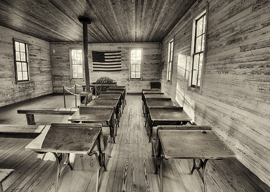
April 06, 2018

Source: Bigstock
Boys must learn that authority and rank, though often mixed or worse, can be noble things. Professors think that they are wise to teach students to regard authority and rank as such with suspicion and resentment, yet this merely reflects their own conceited pathology. Authority and rank do not cease to be necessary simply because we don’t like them. Besides, there is in human nature a natural instinct to revere what is praiseworthy. There are videos on YouTube in which his soldiers display the profoundest respect for James “Mad Dog” Mattis. Mattis bravely led his men in extremely dangerous conditions that most of us cannot even imagine. For that they rightly hold “the warrior monk” in the highest regard. I have a much older scholarly friend to whose judgment on certain matters I am happy to defer. The reason is that he knows a lot more than I do about those things. It is therefore my good fortune to gain from him. The proper attitude here is reverence, not resentment, which both poisons the soul and precludes its elevation.
At the secondary level, boys should be taught by men. Student gender segregation also is desirable. And it would be silly to perceive “sexism” or “misogyny” here. We have seen the consequences of an education system dominated by women: boys put on drugs because they are boys and made to feel guilty about themselves for the same reason. It would be far better for a boy to have no education at all than to undergo a feminized one. The present system is the way to destroy a country; it is emphatically not a path to excellence.
Excellence, both of mind and character, was the purpose of education as it was classically conceived. William James captured this with his customary sagacity. “Our colleges,” he wrote, “ought to have lit up in us a lasting relish for the better kind of man, a loss of appetite for mediocrities, and a disgust for cheapjacks. We ought to smell, as it were, the difference of quality in men and their proposals when we enter the world of affairs about us.”
The question is, what kind of curriculum best trains the judgment to this evaluative purpose? Here a return to the traditional liberal-arts program is necessary. STEM is of tremendous value, both intellectual and practical, but a wise character is primarily shaped by studying literature and philosophy, religion and history (including military history, now terribly neglected as students waste their time on Peace Studies—a laughable subject). More than any others, these subjects comprehend enduring lessons and insights. Of course, about this traditional conception of the liberal arts many people who call themselves scholars are now skeptical. Indeed, this has been the case since the late 1960s, when the Western Canon began to give way to feminist and multiculturalist resentment. If, though, someone finds that Sophocles has nothing to teach him that he can’t get elsewhere, and if he doesn’t get much more from Fyodor Dostoyevsky than from Felicia Hemans, then the problem is simply the reader himself. He is a poor student who should try to work harder.
When boys and men are free to be what they are, aided by a system of proper subordination (in contrast to sentimental leveling, or “equality”), the dynamic achievements are incomparable, whether it’s the studio system of Renaissance Italy or the universal scholarship of the old German research universities.
Comments on this article can be sent to the .(JavaScript must be enabled to view this email address) and should be accompanied by a name, city and state. Your comment may be published on Taki’s Magazine later this week.